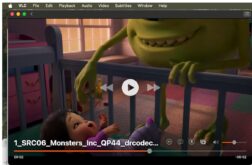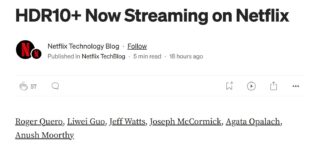VVC is one of the three codecs to be launched by MPEG in 2020. I wrote about VVC extensively here (business side) and here (technical side), and wanted to provide some quick updates. By way of background, codecs have two sides, the performance side, and the business side. In this short article, I’ll address both.
Fraunhofer’s VVenC Sets New Standards in Accessibility and Usability
I recently tested Fraunhofer’s VVC codec (VVenC) for Streaming Media Magazine. All was quite positive, but my lips are sealed on performance until the article comes out. What I wanted to share here was that Fraunhofer did an excellent job making their codec both usable and useful. Most codecs are released with all encoding parameters enabled and accessible but little guidance regarding how to use them. Many have presets that extend encoding time beyond what’s reasonable only to deliver negligible quality gains. In contrast, Fraunhofer released VVenC with two encoding modes, standard and expert.
In standard mode, you can set basic encoding options like resolution and data rate, choose an encoding preset, and little else. In expert mode, you get access to all the encoding parameters in the VVC Test Model that few compressionists actually use and fewer still should use without weeks of benchmarking. I happily tested in standard mode. During testing, I found that the highest quality preset took only 4x longer to encode than the fastest preset so all encoding times were reasonable. Even better, Fraunhofer provides guidance as to the encoding time/quality tradeoff for each preset so you can make an intelligent preset selection without hours of experimentation.
All in all, my experience with VVenC convinced me that VVC encoding is much closer to being a reality than I originally assumed. That said, for playback, VVC is still likely a “hardware codec” that won’t be widely deployed until decoding hardware is available. That won’t be until 2022 or so, and maybe later depending upon how the business side sorts out.
Moving Forward With Patent Fostering
Speaking of that, celebrity compressionist David Ronca, formerly of Netflix, and now with Facebook, defined the current state of the VVC business side in a couple of comments to his LinkedIn post here.
Later, Ronca added.
In response, Thierry Fautier, President-Chair at Ultra HD Forum & VP Video Strategy Harmonic, assured:
How can Thierry be so sure? As I explained in this article, one of the functions of the Media Coding Industry Forum (MC-IF) is to “identify possible mechanisms to improve the future IP licensing ecosystem of VVC.” One of the avenues that MC-IF is pursuing is patent fostering, which is defined as “the process of encouraging patent holders to consider the formation of a pool covering a technology, for example, a standard. The activities of fostering can include raising awareness of the attractiveness of pooling to launch a market for the covered technology, initial meetings among potential rights holders, agreement on methodology for the choice of a facilitator, establishment of criteria for the choice of patents to be included in the pool, etc.”
MC-IF met on September 24, and on October 20 released a statement that ” Following their meeting on 24 September 2020, the participants in VVC Pool Fostering issued a call to administrators of patent pools to make proposals to facilitate the formation of a single pool covering patents essential to the VVC standard. As a result of that call, VVC Pool Fostering, an activity sponsored by MC-IF, will hold a series of virtual meetings on 26 and 27 October to consider presentations from four competing administrators. The participants have set a schedule to achieve, before the end of 2020, the selection, by consensus if possible, of an administrator. Their objective is that a single patent pool covers a critical mass of VVC-essential patents.” I’ve pinged my contact at MC-IF as to when the group will announce the results and will update this article if and when I hear back.
One potential fly-in-the-ointment was the Draft VVC Licensing Program announced by Access Advance (formerly HEVC Advance) that included a joint VVC and HEVC license “that is expected to provide a substantial discount for products with both VVC and HEVC technologies.” I’m guessing that Access Advance is one of the pool administrators presenting to the MC-IF; if they aren’t selected (or if they are not presenting), then we may have multiple pools for VVC.
Note that multiple pools don’t necessarily doom a standard or even hinder its adoption; there are many successful technology standards with multiple pools. What hurt HEVC were the delays in some of the pool’s formations, uncertainty as to whether the Velos pool will charge royalties for HEVC-encoded content, and the potentially 6x price increase (or more) over H.264 royalties.
Still, I’m more with Ronca than Fautier on this one; unless and until we see clear and unambiguous terms from one or two pools that represent most of the known VVC IP holders, all the great work done by Fraunhofer and other VVC encoding vendors may be in vain.
 Streaming Learning Center Where Streaming Professionals Learn to Excel
Streaming Learning Center Where Streaming Professionals Learn to Excel












